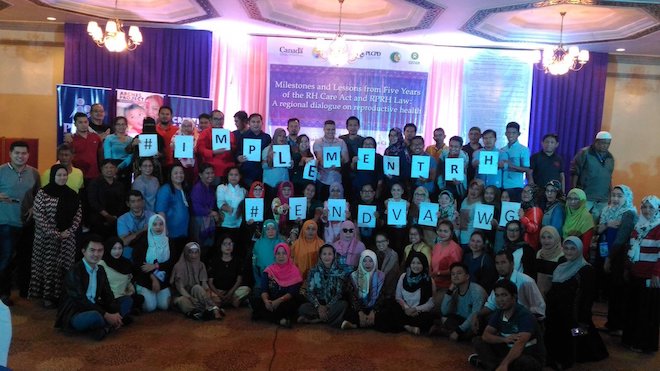RPRH Law five years on: Uphold sexual and reproductive health and rights, fully implement the RPRH Law

The implementation of the Responsible Parenthood and Reproductive Health (RPRH) Law, which has faced huge and constant challenges since its enactment five years ago, has not been smooth-sailing. But the story of how these serious obstacles are overcome reveals the resilience of both implementers and advocates of the law and gives hope for the future of its implementation.
The National Implementation Team (NIT) for the RPRH Law reports that policies to operationalize the provisions of the law are in place. These include administrative orders on family planning, maternal and child health, ensuring RH care in humanitarian crises, and many others. Even President Duterte issued an Executive Order to accelerate the implementation of the law and eliminate the unmet need for family planning by 2022.
Recently, the Department of Education (DepEd) issued a Department Order that sets the guidelines for the implementation of comprehensive sexuality education. According to the DepEd, age- and development-appropriate sexuality and RH education will be integrated into relevant subjects in all schools in the Philippines by the start of the next school year.
In terms of improving both demand generation and service delivery, the strengthening of service delivery networks on the ground and the involvement of civil society organizations are recognized as good practices. In fact, it was the effort of civil society organizations that filled the gap in family planning when the government was limited by the Supreme Court temporary restraining order (TRO) on public procurement and distribution of select family planning commodities for more than two years.
The legal barrier, particulary the TRO, had stalled the discussion about reproductive health on family planning, and left the 11 other elements of reproductive health on the back burner. Apart from the series of legal battles that has marred the implementation of the law—from question regarding the law’s constitutionality to the TRO—the other key challenges to full implementation include: uneven technical capacities of local government units (LGUs) and outright refusal of some LGU officials to implement the law, lack of public awareness on reproductive health and the law itself, and difficulties in mobilizing financial and human resources for a comprehensive program on RH.
The current situation on reproductive health may be indicative of these challenges; the most recent National Demographic and Health Survey (2017), data from the civil registry, and other authoritative studies show very little improvement regarding contraceptive use, reducing unmet need for family planning, reducing maternal mortality, and other indicators. A growing area of concern that the government needs to face head-on is adolescent reproductive health, particularly the issues of adolescent pregnancies and HIV. In the Autonomous Region in Muslim Mindanao, key indicators for family planning and maternal health have slightly improved, but they are still far below national averages.
Indeed, much needs to be done in terms of advancing reproductive health in the country. The good news is that the country is not starting from scratch; the resilience of those who believe in the law and the enabling policy environment created by the RPRH Law and the RH Care Act in the ARMM are good starting points.
This National Family Planning Month, and in recognition of the centrality of access to family planning in reproductive health, we call on dutybearers to pursue the full implementation of the law, paying full attention to all of its elements. We also pledge our contribution and commitment to ensure that the Filipino people are able to fully claim, without any obstacle, their rights to sexual and reproductive health.
This call is made during the inaugural regional dialogue on RH attended by participants from the national government, the regional government of ARMM, the local government units of Basilan, Sulu, and Tawi-Tawi, civil society organizations, and the media, and held in Zamboanga City on August 16-17. The dialogue is organized by the Philippine Legislators’ Committee on Population and Development (PLCPD) under the ARCHES project. ARCHES stands for “Improving the Availability of RH Services in the ARMM.” It is a five-year project supported by the European Union and Oxfam. The other implementing organizations of the project are the Philippine Business for Social Progress (PBSP), Al-Mujadilah Development Foundation (AMDF) for Lanao del Sur, Pinay Kilos! (PinK!) for Basilan and Sulu, Tarbilang Foundation, Inc. for Tawi-Tawi, and United Youth of the Philippines (UnYPhil)-Women for Maguindanao.
